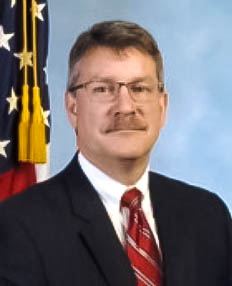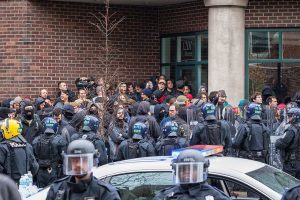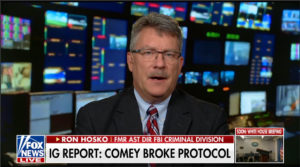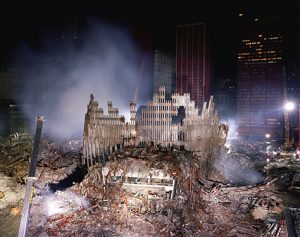Take federal and local law enforcement out of our society and consider the anarchy from within, and without, destroying our country. Getting a speeding ticket or even undergoing government scrutiny are minor inconveniences if you consider the total absence of a legitimate societal oversight and protection
The biggest organization currently under fire for NOT doing its job, and in fact being an obstruction to true justice, has been the FBI. The majority of which are true patriots doing their job but being hampered or allowed or led by their leaders into committing their own crimes.
There’s no better place to find truthful, rational, relevant inside information and opinion on today’s DOJ environment that going to the top. I had the privilege to speak with a former Assistance Director of the FBI, Mr. Ron Hosko. His candor and valued thoughts help to give perspective to our daily exposure to current events. There aren’t a lot of individuals with a more diverse and in-depth law enforcement background.
Ronald T. Hosko retired from a thirty year career in the FBI. A graduate of the Temple University School of Law, he began his work as a Special Agent in Jackson, Mississippi. In the late 1980s, he transferred to Chicago, working undercover and in assignments focused on complex financial crimes and violent crimes. He worked closely with other federal, state, and local law enforcement partners in multiple joint task forces and served on both the Jackson and Chicago SWAT teams targeting the most dangerous subjects of FBI investigations. He went on to lead the FBI’s Crisis Management Unit in Quantico, Virginia before serving as an assistant special agent in charge in Philadelphia from 2003-2007. During that time, Mr. Hosko was awarded the FBI’s Shield of Bravery for his actions during a violent ransom kidnapping.
He was promoted to the Senior Executive Service and served as an inspector where Mr. Hosko conducted multiple serious and fatal shooting investigations involving FBI and associated law enforcement personnel and led a seminal 20 year review of FBI shooting incidents. Ron was promoted to serve as special agent in charge of the Washington Field Office’s Criminal Division, overseeing all criminal and cyber cases in the FBI’s second largest field office.
In 2012, he was asked to serve as assistant director of the FBI’s Criminal Investigative Division, responsible for oversight of the organization’s largest program, worldwide. He has served in important roles at the Salt Lake City and Torino, Italy Olympics, World Cup, national political conventions, and events including the Oakdale Prison siege, 9/11, Hurricane Katrina, and many others.
This is part 1 of our look into today’s FBI where we talk about everything from Ron’s time working under Mueller and Comey, to 9/11 incompetence and the Obama influences.
Assistant FBI Director Speaks Up:
RB – When growing up in the 50s and 60s, many of us got our adventure by playing the all-encompassing cowboys and indians. Maybe in the last few decades with the cold war and political events, it changed to spies and counterspies. Either way, it’s the norm in the world for good guys vs. bad guys. What prompted you to choose the path you did and what did you do to prepare for it and secure it?

Ron Hosko, Former Asst. Dir FBI and President of Law Enforcement Action Network. Photo courtesy of LEAN
RH – I was, like lots of kids, enthralled by the lights and sirens and drama of police work. Even, fire, for that matter. Watched The FBI (in color), Efrem Zimbalist, Jr. and other great crime fighters of the 60s, so that was always in the back of my mind. I’d applied for the Pennsylvania State Police and tested highly but not highly enough in the era of affirmative action there, so after college I decided to try for the FBI and I went to law school as my path in. It worked – I was accepted in after graduating Temple University Law, and I started training in Quantico shortly after taking the bar exam, in 1984.
RB – And how does the pursuit of such a career differ these days in terms of expectations and preparation?.
RH – Expectations and prep for a career in the FBI are higher still – they take a range of very smart, energized, experienced people from science, the military and law enforcement, law and accounting, and other diverse backgrounds and give those who make it in untold opportunities for adventure, service, and upward mobility. The FBI is a global operation, that though relatively small (about 13,000 agents) has outsized impact both here and abroad. I have nothing but positive memories and thoughts about the people there and the opportunities they gave me in my career. Anyone contemplating a career there should be ready to compete with great patriots, people with tremendous educational backgrounds, people who’ve led troops into combat and demonstrated heroism on the battlefield.
RB – So many people I’ve talked to from the bureau have that positive memory and pride, but it must hurt tremendously to see what’s become of the top leadership and how they’ve warped and manipulated the organization for personal or certainly political gain?
RH – It’s deeply concerning how the FBI has ended up in the middle of a political firestorm. Like I did in my FBI career, I want to see PROOF of what is true, what’s fiction, what is a blend, so I’m eagerly awaiting the IG’s report on the Clinton email investigation. I worked with Jim Comey and respect him. I never saw any piece of a politically driven agenda, or any personal politics at all, by him or those he surrounded himself with (myself included) but disagreed with his ill-fated decision to put himself in the prosecutor’s role when commenting on HRC and her emails. That decision put him (and the organization) on a path to the middle of politics during the election. I, and many others, were sickened to read the Strzok/Page texts, which suggested a political animus. Again, I hope the IG tells us all whether those views infected their work in any observable way, but regardless, great damage has been done and a price (in trust) is being paid. Finally, I did read the IG report on McCabe and found it compelling. McCabe has paid a big price for the missteps and has also damaged the FBI “brand.” I hope Director Wray rebuilds his executive team and works every day to ensure an apolitical FBI, which is an absolute must.
Meanwhile, I think there are lots of uninformed voices out there who don’t even care to wait for or understand the facts before they try to damage the FBI’s reputation. Just today, the House Speaker credited Trey Gowdy’s recent assessment that the FBI didn’t run a “spy” at the Trump campaign and that they did what the public would want them to. Time will tell whether that sort of comment is too little too late.
RB – The truth will come out… good or bad. As we talked about, in the good ol days, they generally wanted either an accounting or law degree to even be considered for being an agent, and women originally were not even considered for such positions outside the steno pool. How did that mindset make for a great agent then and what backgrounds are most favored now?
RH – Accounting and law were valued backgrounds then, and now. Those disciplines help teach logic and reasoning as well as the specialties that are needed in FBI agents. Women began getting hired in greater and greater numbers in the 80s and they now form a critical part of the workforce. We sometimes joke about “that person” not being a rocket scientist but the FBI actually has hired some rocket scientists, other folks with advanced degrees in arcane subjects, and broadly a workforce with tremendous capability and depth. I had a bunch of folks who were military academy grads on my squad in Chicago and they were phenomenal agents. The FBI is looking for leaders, folks with proven abilities and track records of success, people from diverse backgrounds.
RB – As you worked your way from Jackson, MS through Chicago and then to Quantico, did you envision yourself in a long-term career with an ultimate goal or did you take it as it came, learning and preparing keeping many options in public service in mind?
RH – I was a baby boomer and like many of that generation, I wanted stability for myself and my family. I entered looking at the FBI as my career, a job I’d do for 25 years or more. That comes with a degree of sacrifice because you know going in that government employment will never make you rich, that you’ll never have the biggest house or the coolest car. The tradeoff is that it can come with tremendous satisfaction that follows successful resolution of a big case, the arrest of a bad guy, the dismantling of a dangerous criminal enterprise, the defeat of a terrorist plot. For me and many colleagues, that was a worthy tradeoff.
I never had a different career in mind because I loved the camaraderie, the opportunities, the successes, the teamwork, the ethos of the organization and my coworkers.
RB – In 2012, you found yourself serving as the Assistant Director of the FBI. With the state of country and the world at that time, were there overwhelming pressures at times dealing with the many ever-changing landscapes of law enforcement both locally, domestically and internationally?
RH – FBIHQ can be an incredibly challenging environment. There’s a constant demand for current information on breaking cases and events, a need to be continually informed. That meant very long days and nights, including weekends, for planning and prep. At that level, there’s little actual “work/life balance” because you’re always “on”. I think that leads to some of the turnover in leadership at the highest levels. There’s a degree of exhaustion that’s inevitable and demands that you find change after a time in that seat. The threat does evolve and we were always looking at ways to better understand the threat and to apply available resources against it. Congress and the Administration didn’t always make our job easier – we could have easily used hundreds more agents and support personnel and the budget challenges were always great and made harder by sequester, delayed budget agreements and government shutdowns.
RB – As you look back over your 30 year career with the bureau, certainly the intensity has changed, and there’s more satellites and less keyholes for listening, but how has the change in problems and technology affected an agent’s ability to the his/her job? And what mental effects does the current state of expansive problems have on an agent?
RH – The FBI was accused of having failed to connect the dots that would have prevented 9/11. Some of the criticisms are fair but the FBI, in my estimation, was always a great intelligence agency. For decades, agents collected bits of intelligence, identified subjects and corrupt organizations (and spies), and disrupted and dismantled them. We built huge corruption and racketeering cases – that’s all intelligence collection and analysis with a purpose. But as our world has changed, so must the FBI. The shifts to a cyber and connected world meant we had to evolve to understand how to capture the digits and electrons, how to store them, how to bring them back into court and explain how we knew what we knew. As our collection techniques became known (and mimicked on TV shows and in movies) those devices and techniques had to get smaller and better. And, with some scandals of the past, the FBI had to develop and follow (and police) internal guidelines that would keep it from trouble in the future. We did so with the Domestic Investigative and Operations Guidelines (DIOG) that serves as a kind of bible for operations. Much is expected of today’s FBI, in fact, many expect perfection. Know and follow every rule faithfully, crack every case, prevent every crime and terrorist plot. It’s a high bar.
RB – Much of your time was spent in more violent crime activities, even having served on multiple SWAT teams. Have you seen the level of violence and criminal obstinacy grow?
RH – No and yes. I’m proud to have been part of the effort to make America safer. We succeeded in many ways: violent crime was, in 2014, about half of what it was in 1990. That means thousands fewer victims, thousands fewer families losing a loved one to murder. Despite recent spikes in homicide and violent crime, we’re far safer than we were 25-30 years ago and we owe law enforcement much for that. But I have witnessed the rise of the viral video there parts of a police encounter are captured and retransmitted without full context. And, I believe, as a result, we’ve seen horrific attacks on police simply because they are the police, and we’ve seen a change in attitude by others who think they have the right to obstruct, fight, curse and spit at, and otherwise resist lawful authority. It’s very concerning and I think the impact on recruiting for police work is profound. Applicant pools across the country are drying up. That is a troubling trend that must be reversed.
RB – And as our society has changed over the last 30, 40 or 50 years, has that “change in attitude” come from a lack of parental guidance, even punishment played out as a part in youth’s “no fear of authority” mindset?
RH – My sense is that is so. We have far more broken families, kids being raised by the available electronics while parents are busy at work, too little accountability as kids are growing up. When kids get in (or start) trouble at school, the parent(s) go on the attack and defend the indefensible. The school retreats and the kids learn they can get away with bad behavior. What will be the result long term – I think we’re seeing it.
RB – As a follow up, has liberalism added to the lack of respect for the law and law enforcement?
RH – In my estimation, without question. Liberalism seems to defend any written or spoken bad behavior that serves their purpose as lawful First Amendment protected activity. Our norms and standards have fallen steadily for the last 4 decades. I was walking through a major airport recently and a young lady had vile obscenities in large letters on her t-shirt. Did we see that in the 70s or the 80s? Every child in sight could have read that language and asked a parent what it meant. We also saw the impact our last president’s liberalism had on policing – he was quick to condemn a questionable police encounter as race-driven policing, heavy handed policing. Too often he was wrong yet his message was sent and it was loud and clear.
He (BHO) was complicit in the negativity toward police that is still felt today. Add to that the willingness of the liberal media to tell only the part of the message that stirs controversy and you have just what the media wants – conflict.
RB – And so the media is fueling the flames of violence and dissent rather than presenting facts and helping to discover solutions?
RH – Without a doubt. I’ve seen again and again where the media intentionally tells the story in a way that feeds trouble. Look at Ferguson, at Baltimore, at Charlotte. All places where the lies are told and repeated with little question, only to have the truth try to catch up months later. Then, the truth is presented as a footnote, not the headline. That’s by design, not by accident. Media outlets today are serving their political masters and are trying to sell advertising. They do that by spinning the stories in a way that stirs or creates conflict or gives the slant they prefer. That happens on both sides of the political spectrum, of course.
RB – And it’s odd that crime rates have been falling while young people’s intransigence has been increasing. Certainly, making law enforcement’s job harder and more dangerous.
RH – in late 2014, continuing into 2015 and 2016, violent crime rose, homicides rose, fatal attacks on police rose, ambushes on police rose. These alone are cause for concern; in combination, they should have our full attention. Our country is politically polarized, with people on opposite sides barely able to agree on what day of the week it is. Law enforcement, unfortunately, finds itself in the middle of it, trying to settle conflicts in an angry, undermedicated country. They are the first to respond, the ones expected to “figure it out” in seconds and resolve conflicts to everyone’s complete satisfaction. Throw in massive mental health problems from coast to coast and you have some appreciation for the difficulty of that work.
RB – in the years you mentioned of 2014,15,16, we were in the final years of a very liberal, almost 60’s radical administration that had it’s own lawlessness running rampant through the admin and its controlled people and groups. Did this overly liberal, unaware or unconcerned attitude lead in part to our society’s destructive and violent nature toward law enforcement?
RH – Not sure about that as a conclusion. They were certainly very liberal but I don’t think unaware. I think it was deliberate. These were smart, educated people who knew what they were saying and knew if they said it enough, regardless of its essential truth, that it would have an effect. Maybe the intended effect was to foster discontent, some protests, some noise, some disruption. Maybe the intent was worse. But, in my opinion, it was wrong in its timing, wrong in it’s repetitiveness, wrong in how it took hold. The mainstream media treated Obama with kid gloves. And when he suggested and repeated police abuse or misconduct, especially on account of race, the media was more then happy to oblige him by fanning the flames. Look at the lie of Ferguson’s “hands up, don’t shoot.” Quickly, CNN commentators assuming the pose, Rams players, congressional reps, others. All based on a lie that so many so readily and happily embraced. Obama was complicit, as were many others. But he was educated, a Harvard trained lawyer. Meanwhile, while he was pointing fingers at police, look at what was happening in Chicago, in Baltimore, in St. Louis and Memphis and Philly. All democrat cities with big swaths of black urban poor. Yes, the police paid a price but those who can’t leave these places paid the biggest price, in blood. Hundreds more killed – not by police, by other citizens. Criminals saw the gap when police started pulling back, criminals filled that void with gunfire and carnage.
RB – Are we reaping the whirlwind of 60’s radicals (both in society and in government) all grown up and passing on the genes of dissidence and violence? Is the fatherless society adding to our major discipline problems?
RH – Re the latter, I think so. Our reality is that very often where a family has two parents living in the same house, both are working, both are busy and traditional child-raising is far different than in the 50s and 60s. We’ve heard a lot about the fracturing of the nuclear family in recent years; divorce is increasingly likely for any couple – maybe a 50/50 proposition and the damage to the kids in that environment can be profound. Some three quarters of blacks are born out of wedlock (Washington Examiner article on black births), the percentage is far lower for Hispanics and whites. There’s plenty of commentary out there suggesting ties between kids raised in single family homes to offending rates. So, while this might not be the genes of radicals, I think there’s some evidence that our changing family “models” may help feed crime and violence.
RB – You had your time dealing with cyber cases. Many worry we’re just not prepared enough for the multitude of damaging activities that foreign and domestic groups could wreak on this country. The FBI probably has its share of investigations in this area, but why hasn’t the government taken the threats to our utility grids, banking structures, defense systems etc. more seriously? Do they deny the risks or will it take a technological 9/11 to grab their attention?
RH – We’ve seen too often that America, a city, a business, an industry, needs a crisis before meaningful change comes. A major cyber disaster is looming for all of those entities. Russia, China, Iran, North Korea, “hactivists” and many others have the capability today to cause major disruptions and to take many lives. I think some of our government components (FBI/DHS/USSS) are working very hard to keep abreast of threats, to attribute intrusions and mitigate them, and to keep us informed. But I think with the speed of tech developments and willingness of bad actors to use tech for bad purposes, government is playing “catch-up” every day. Add to that that so many of us are relative novices in tech and cyber defenses, that we are ineffective at protecting our own desktops, laptops, networks, that we don’t know what questions to ask let alone know what the answers mean, that we’re all very vulnerable. Look at the recent warning by the FBI that Russian actors were injecting malware to US routers and that we could mitigate the harm by resetting our routers, including those in our homes. What percentage of folks do you think heard the message and took the steps the FBI recommended. I’d bet less than 25% and maybe far less. That’s a big vulnerability and it happens every day in places big and small. This threat is real, it’s big, it’s persistent, it’s growing daily. We all need to be paying attention and getting smarter about it.
RB – A lot happened during the 8 years of BHO in office. Was he more focused on social agendas than on true awareness and protection of the country… especially in the areas of growing NSA domestic spying under Mueller? I think the revelation of things to come came with his and Holder’s desire not to pursue or prosecute the Black Panther’s actions at the Philly polling place: Something Bush wanted to finish.
RH – BHO did have a social agenda, a very clear one and I think his criticisms of police before there was evidence played right into it. I think those criticisms were too often very unfair and that he intended to put his finger on the scales of justice. He had an AG who was often an echo chamber for the president’s ill-timed and -informed comments and, in combination with other factors had the effect of putting police on their heels. That damage has been done and hopefully it can be undone by a president and AG who have spoken very appreciatively of police and the sacrifice they make for us. I don’t know the specifics of why DOJ failed to prosecute those Black Panthers in Philly but it looked like a clear case of voter intimidation that should have been addressed.
I do believe the NSA is staffed by patriots who are duty bound to protect America from hostile foreign actors; they should always be guided by the Constitution and the rights of Americans protected appropriately, including through effective Congressional oversight.
RB – I’ll never forget being at home the night of 9/11. I got a strange call from an east coast number and all the guy said was…. “today you got what you deserved.” It was chilling and I immediately wrote down the number, called the local FBI office and reported it. I felt almost dismissed as if I was calling drunk from a bar somewhere, and of course never got a follow up call, further inquiry or anything from the local office. Looking back, has the bureau’s working environment, openness to civilian help, tips and information changed a lot in the last 30 years in terms of morale, awareness and efficiency?
RH – In our post-9/11 hours and days, the FBI was literally flooded with calls and tips like yours. You’ve heard the term “drinking from a fire hose” and I’d say that doesn’t come close to the volume of information we were trying to process so you shouldn’t look at it as being dismissed as much as an organization that was in full crisis mode trying to process what was important, get agents out to those leads that seemed like priorities at the time, etc. I do think the FBI today is far better in managing crisis information but the reality is that any massive event would again cause some earthquakes inside the biggest and best run organizations. As you know, the FBI now has centralized it’s public tipline work, in West Virginia. They can surge additional employees to handle surges of tips on cases that get heavy media attention – all good. Except when something in the system fails – like a clear, detailed and concerning tip about a school shooter that, for whatever reason, the tip taker fails to relay to the office of interest. In my time, we had agents who were responsible for taking complaints (and often support personnel) every day. You were known as the “complaint agent” that day. A great number of the complaints had nothing to do with FBI work, our jurisdiction and plenty involved folks who were paranoid, suffering delusions and other mental illnesses. So, it may have made sense to centralize and economize the effort across 56 field offices. The FBI knows well it will be far less successful without a supportive public and to that end, all offices host citizens academies, recognize people who provide great support to them and the community, and take other steps to engage the public and help them understand the mission, the work, and the great people who do it.
On efficiency: the FBI is always looking at better ways to apply their resources; however, among the biggest complaints in the last decade has been the “administrative burden” on agents. All are expected to be in an almost continual learning/training mode, most type their own reports (steno pools are long gone), many are on specialty teams like SWAT, Evidence Response, crisis management/negotiation, and many others, so their days are very very full and most agents feel like they need more “street” time and less office time but they must address all their “admin” requirements with few exceptions. Finding the right balance can be very difficult.
Our gratitude goes out to Mr Hosko, not only for his service to our country, but his time and insight in helping me to write this article and bring to light some thoughts from the inside of a most important government agency.
In Part 2 we talk more about 9/11, the “Ferguson Effect,” the Directorships of Mueller and Comey under which Mr Hosko served, and Trump’s actions with AG Sessions.
RB ~





Recent Comments